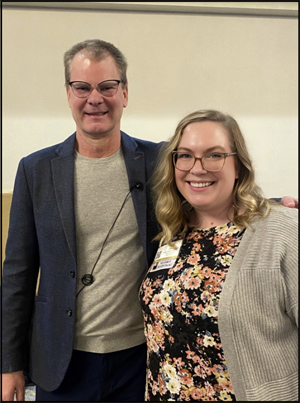New Orleans is known for its robust culture, its annual celebrations, and its remarkable food. Yet every year in the spring, New Orleans is known among select circles for something else: a renowned conference focused on improving literacy for young people. This spring, Theresa Ritta-Olson and I were lucky enough to attend Plain Talk about Literacy and Learning in New Orleans, Louisiana from March 7-10, 2023.
 Numerous sessions featured famous speakers and authors in the realm of literacy, from Doug Fisher to Zaretta Hammond to Nancy Young and Anita Archer. While Theresa and I wished we had been able to attend each session, we split up and attended sessions most closely related to our current responsibilities at ESU 10. Theresa attended the numerous English Learner (EL) sessions and was fortunate enough to come face-to-face with the wonderful Zaretta Hammond, and I was excited to meet one of my favorite literacy authors, Doug Fisher.
Numerous sessions featured famous speakers and authors in the realm of literacy, from Doug Fisher to Zaretta Hammond to Nancy Young and Anita Archer. While Theresa and I wished we had been able to attend each session, we split up and attended sessions most closely related to our current responsibilities at ESU 10. Theresa attended the numerous English Learner (EL) sessions and was fortunate enough to come face-to-face with the wonderful Zaretta Hammond, and I was excited to meet one of my favorite literacy authors, Doug Fisher.
Doug’s Fisher’s session focused on the skill, will, and thrill of reading comprehension, emphasizing how strong literacy instruction provides students with the skill to comprehend text (including decoding and phonics), the will to persevere through challenging text (learning dispositions), and the thrill to act when motivated by learning.
Focusing on skill, Fisher explained that vocabulary isn’t just learning words; it’s about learning concepts. One memorable example he gave was: “How would you pronounce and use the word spelled s-i-n?” I encourage you to take a second to think about your answer before you continue reading. Fisher went on to explain that the answers he received differed depending on his audience. Math teachers, for example, immediately conjured images of hypotenuses and triangles. Fisher emphasized that as we teach vocabulary, we must focus on teaching students word-solving skills along with traditional decoding strategies. Students need to know how to look both inside the word (morphology: think of the word refill and how we use its parts to determine its meaning) and outside the word (context clues: think of knowing the difference between sin in “Not having chocolate available is a sin,” and SIN in “Find SIN (b) in the triangle.”). Zaretta Hammond also echoed the importance of these skills for all readers, including those with diverse educational backgrounds, in her session about Word Wealth.
Overall, Theresa and were appreciative of the immense amount of learning we experienced at Plain Talk. As it was both of our first time attending the conference, we were overwhelmed with the passion for improving literacy skills for all learners that was exuded by the participants and the speakers. We are eager to bring this learning to our services at ESU 10 in the upcoming months.